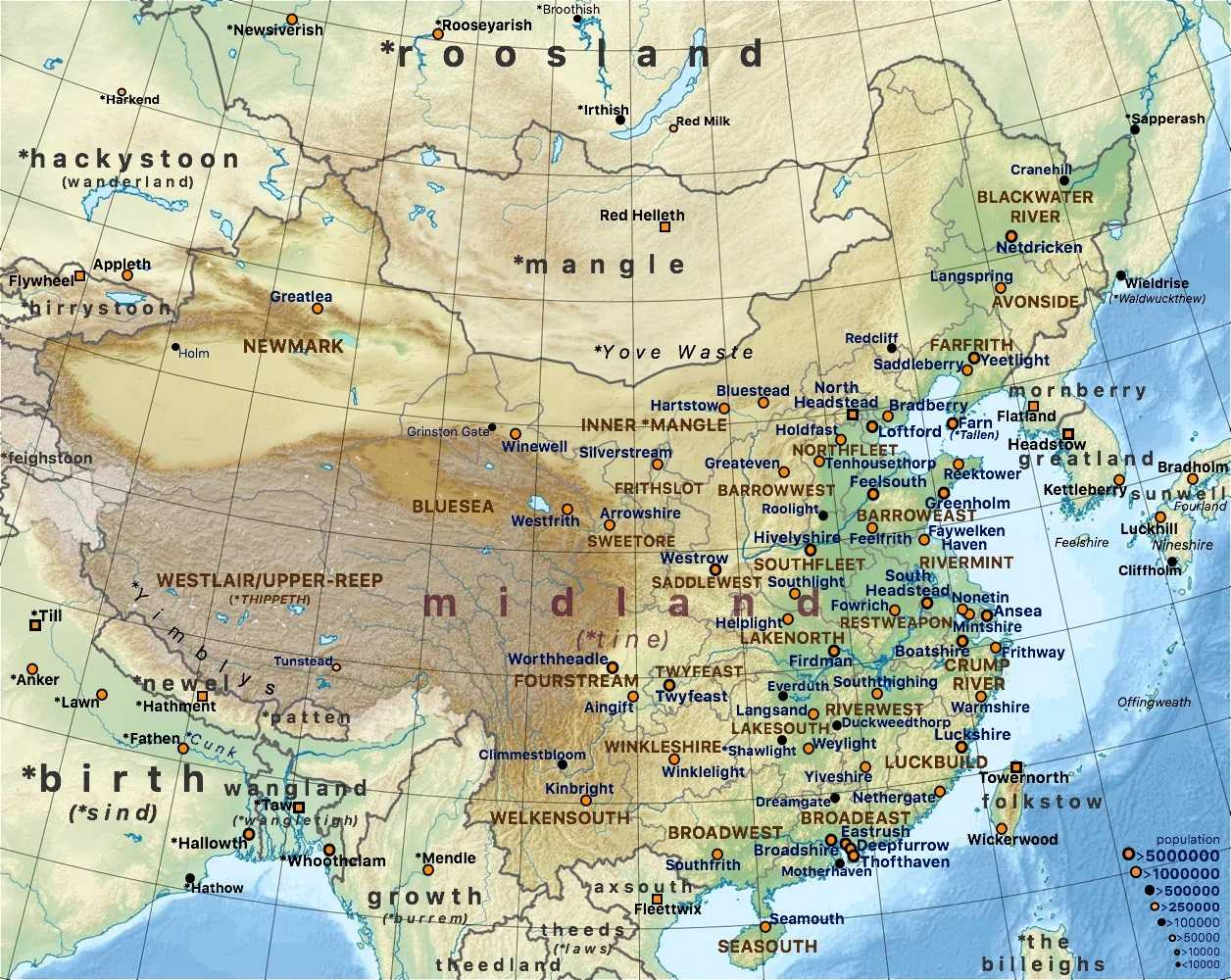Fully anglicised China, based off actual etymologies, rendered into plausible English

topherette:
This is how the (English) map of China might look if names were true to their etymologies*.
As with most of the world, Chinese place names are mainly connected with geographical features and location.
Wanting the names to have an English feel, elements present in actual English and Germanic place names are favoured.
Words of Anglo-Saxon origin are also favoured over Latin-derived ones, thus we have 'saddle' for (mountain) pass, 'kettle' for cauldron and so on. This is mainly to give harmony and familiarity to the names and their sound.
Where available, known or probable original meanings were used; characters that are only used for their sound were not translated. Where no such (convincing) etymologies were available, sometimes the sound was rendered into English e.g. Shaoyang (Shawlight), Mongolia.
Other names:
Anhui -‘weapon’ in Germanic sense of coat of arms, badge cf Ger Wappen, Du wapen
Changde -‘always virtue’. duth/douth/dought cf Ger Tugend -virtue
Chengdu -‘headle’ is calqued on the Latin derived capital
Chongqing -or Twymear, Twyfair. feast and fair from same Latin root. cf Ger feiern Du vieren
Dalian <Ru Дальний far, OE feorran, cf Ger. fern, Ferne
Gansu -‘ore’ reverence, honour cf Ger Ehre
Ganzhou -‘yive’ is another spelling of ‘give’, a translation of the first character
Guangzhou (</*kʷˤaŋʔ/ + /*tu/ would have preferred -bread <*braidį̄ noun form of broad, cf German Breite
Guizhou -矩 original character. square, carpenter’s square, rule. Cf OE wincel, cf Ger. Winkel also set square
Hanoi -same etymology as Kochi in Japan: 河内
Hefei -fow <(ge)fóg joint, joining (to join, add) cf fay and Ger fügen; rich cf Ger. reich ‘fertile'
Heilongjiang -The name "Heilongjiang" comes from its Manchu name "Sakhalian Ula" (Manchu: ᠰᠠᡥᠠᠯᡳᠶᠠᠨᡠᠯᠠ, Mu Linde: sahaliyan ula, Taiqing: sahaliyan ula), where "Sakhalian" means "black" and "Ula" means "water”. The character for dragon appears to have been arbitrarily used for its sound
Hengyang -wey -northern spelling of ‘weigh'
Hong Kong cf Duft German
Jilin <The name "Jilin" – literally translates to "Auspicious Forest" – and originates from girin ᡤᡳᡵᡳᠨ ᡠᠯᠠ, a Manchu phrase meaning "along the river
Jinan, Jining, Jeju -feel cf Ger viel
Kaohsiung <Siraya takau ‘bamboo forest'
Kunming -‘kin’ since can mean both various family members and child, cf Ger. Kind
Lanzhou -*arry is reconstructed from Gk derived ‘orchid’, based on shared PIE roots
Laos & Thai have same etym! cf. *þeudō
Lhasa -tun=town cf Tunbridge Wells
Lianyungang -fay cf Ger fügen, welken cf Ger Wolke cloud
Myanmar -if indeed related to Brahma <*bʰérǵʰ-mn̥ ~ *bʰr̥ǵʰ-mén-s, that word too is related to barrow
Nanchang -‘thighing’ from ‘to thee’, prosperity
Ningbo -way cf waw <wǣġ cf Ger. *Woge -*wave
Ningxia -Xia: great, big house cf Ger Schloss (unfortified castle)
Panzhihua -climb + *ast (branch), could have also reduced to Climpstbloom
Shanghai -'Onsea', compare the reduction of the first element in words like 'again', 'another', 'any' etc.
Shaoguan -dream from OE dreám, in meaning of music. Gleegate was another option
Shaoyang -Shao appears to just be a name, so that character’s sound was anglicised, exceptionally
Shenyang -yeet< OE geotan =to pour, cf Ger gießen
Taiyuan -even cf Ger. Ebene
Tibetymology: འབོད ('bod, “to call; to shout”) Stod-bod (pronounced Tö-bhöt) "High/Upper Tibet”; ‘lair’ cf German Lager -store(room)
Ulaanbaatar -‘helleth/helth’ -hero cf Ger. Held
Urumqi <Possibly derived from the Kalmyk/Written Oirat form of Mongolian ülemǰi, “great”), which is short for ülemǰi-yin say iqan belčiger, “great pasture”).
Wuhan -fyrd common OE word meaning military. One of the meanings of, and radicals in ‘Han’ is man.
Xi’an -row/roo cf. Ger. Ruhe rest, peace
Yantai -‘reech’ cf Ger Rauch ‘smoke'
Yumen -greenstone is another name for jade
Zhejiang cf Ger krumm crooked
Zhengzhou cf Ger hoeflich polite, lit. of the court
Zigong -ain Scots form of own. Ownyift was another option
*For many names there are various competing theories about the etymology. The author has chosen the simplest and most accepted/convincing one.
I'm sure some of you could have/would have come up with different names too- feel free to share them!
Collection: anglicised - Tags: anglicised, china - Source: reddit.com